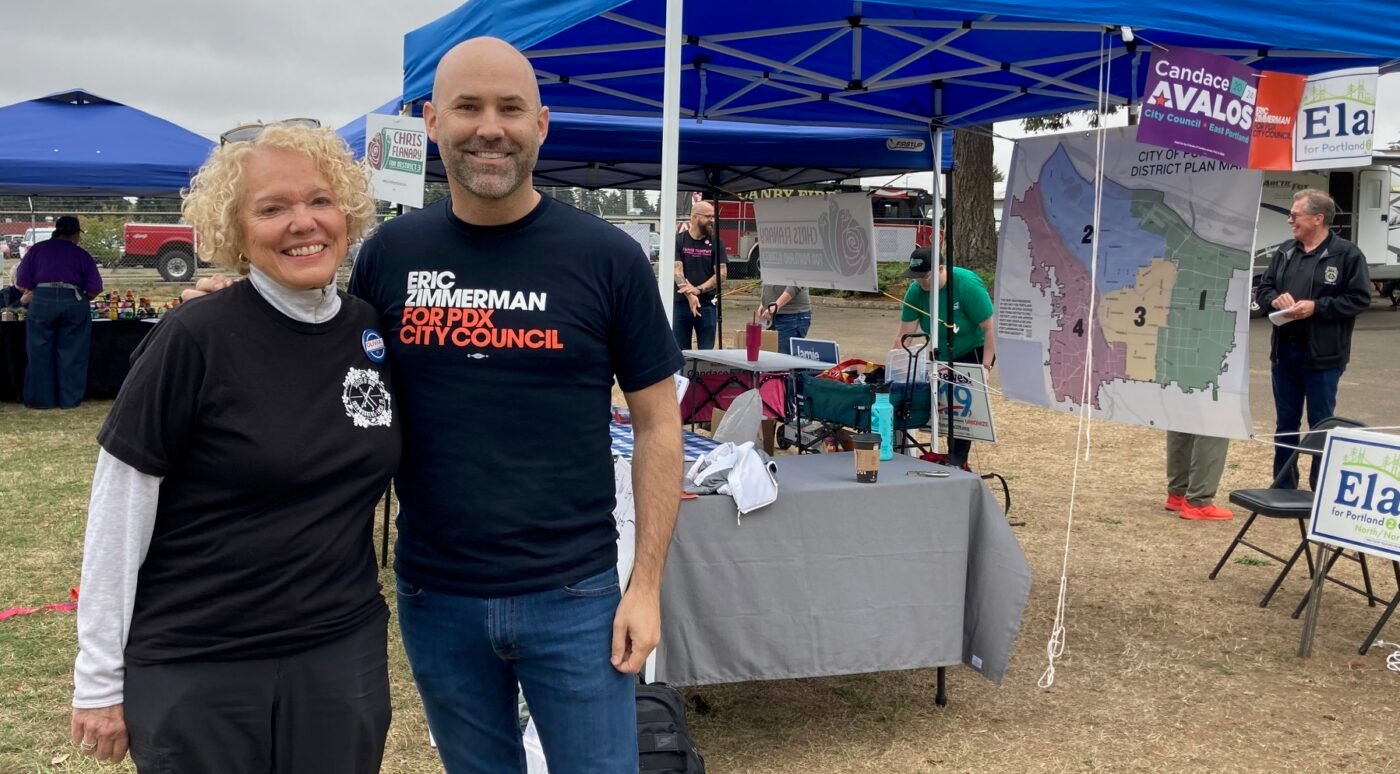
Labor Day marks the start of the last leg of the race to November’s election, and the candidates at the Clackamas Fairground were working hard. The Northwest Oregon Labor Council’s fairground picnic was the occasion for this AFL-CIO group to introduce its endorsed slate of twelve candidates running for Portland City Council positions.
Endorsements are important in any election, but this election is the first time Portlanders will be voting to fill a reorganized government structure — while using an unfamiliar ranked-choice voting method. Candidates are competing for three positions in each of four newly-formed geographic city council districts, for a total 12-person city council. The previous council structure was four council members and a mayor elected by city voters at-large.
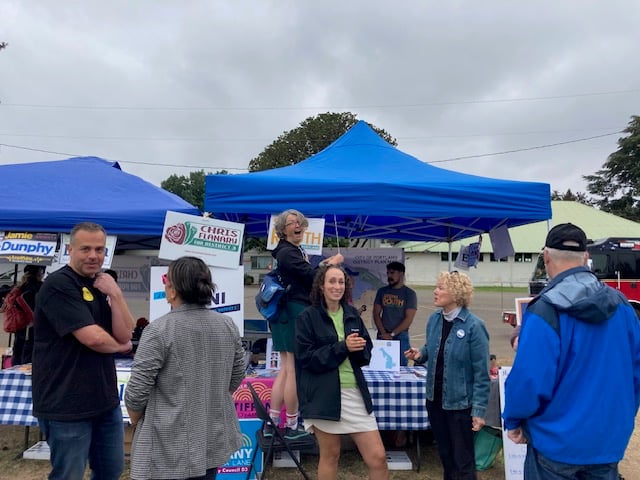
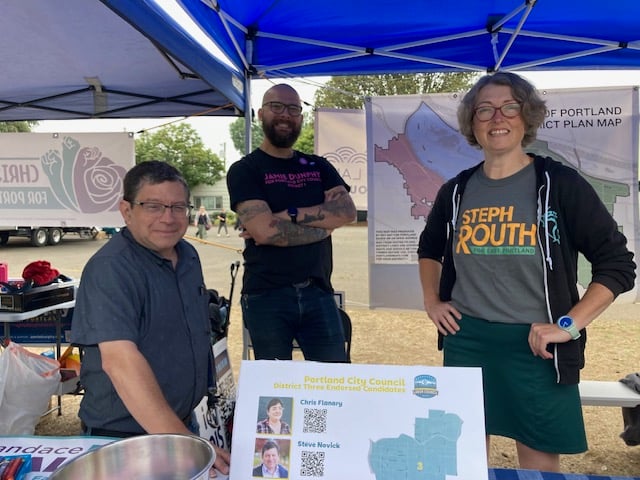
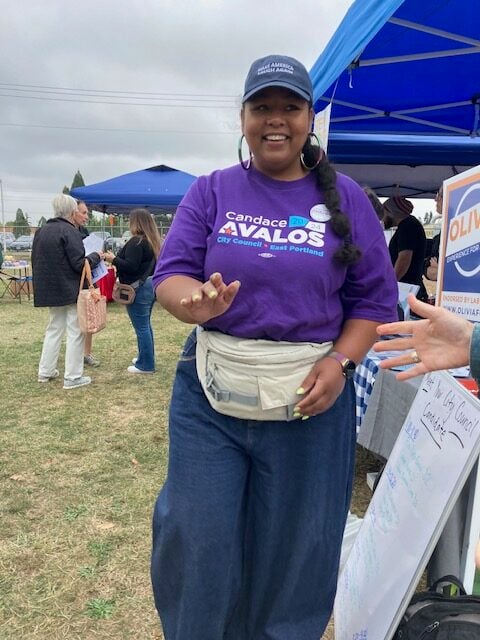
The increased size of the council, together with the reduced geographic area in which candidates have to campaign, has lowered the barrier to entry for council races. As a result, the number of people running for office has swelled. Last week was the deadline for declaring candidacy, and although the numbers are not yet official, it looks like District 1 has 15 candidates; District 2 has 20; District 3 weighs in at 25; and District four has ballooned to 27 candidates running. (The City Registrar doesn’t finalize the numbers until Thursday.)
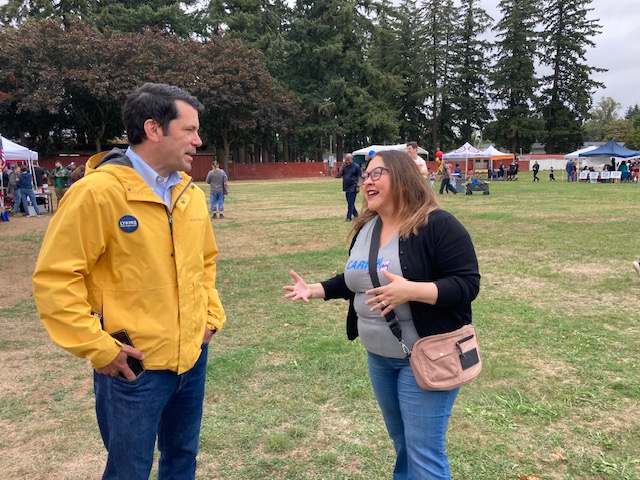
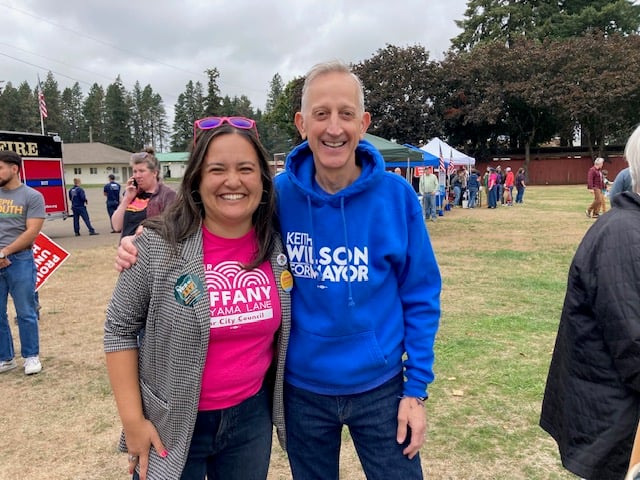
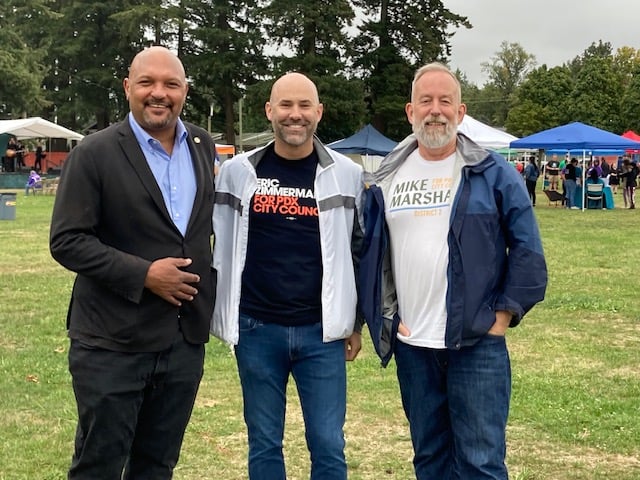
Voters will be looking for all the help they can get to make sense of this crowded field, and that’s why campaign staples such as endorsements and yard signs will be so critical this year. As I wandered the fairgrounds, I tried to learn what strategies attendees were using to come to grips with the abundance of candidates. I was hoping that I would hear something I could recommend to others.
How folks are selecting candidates to rank
The first man I talked with quickly disabused me of the notion that people who attend AFL-CIO events on Labor Day are your typical voters. It turns out that Bing Wong was a past officer of the Multnomah County Democratic Party. His preferred method of eliminating candidates is to go straight to the ORESTAR database (Oregon Election Systems for Tracking and Reporting) and eliminate those candidates who haven’t yet formed a candidacy committee. I don’t think most people know what any of that means, and ORESTAR isn’t real easy to use. But I enjoyed talking with Bing. (And what a t-shirt!)
Next I spoke with Rory Read, a member of Local 483, which is the Laborer’s Local representing city employees. Rory is a bike commuter who reads BikePortland, and he and I had a fascinating conversation about what ails Portland city government, as seen by someone on the inside, in a non-management position. And his recommendation for vetting candidates? Rory goes to “meet and greets” in his neighborhood and thinks it is important to see the candidates in person. I agree.
Finally, I spoke with a young woman working the Measure 117 table (statewide ranked choice vote). She was new to Oregon and planned to rely on endorsements from civic groups and unions.
Nobody I spoke with mentioned one of my preferred methods of winnowing the candidate lists. I use the Portland Small Donor Elections website to give me quick handle on where candidates stand, so I thought I would share that approach with you.
Winnowing with Small Donor Elections data
Portland has a Small Donor Elections program which offers $9.00 of matching funds for every $1.00 donated to a city council candidate by a Portland resident, up to a $20 maximum donation. So if I donate $20 to a candidate, the city will kick in $180, for a combined total of $200 to the candidate. If I donate $100, the city will match $20 of my donation with $180, for a combined donation of $280.
The catch is, the city doesn’t release those funds until a city council candidate qualifies for them by reaching a threshold of 250 donations. In other words, a candidate needs to have hustled enough, be organized enough, and have enough community support to have convinced 250 people to donate at least $5.00 to their campaign. (The next two donation thresholds are 750 and 1,250, and the city caps the matches at $40K + $40K + $40K, or $120,000.)
It’s a good program and it goes a long way toward dampening the influence of money in politics. But it’s the program’s portal which has got me hooked, and which might be useful if the number of candidates is overwhelming you. The portal shows all participating candidates, how much they’ve raised, how much of that money could qualify for a match, and it also groups the donations into tranches, by amount.
This might seem brutal, but I’m not considering any candidate who has not yet qualified for the city’s first round of matching funds. In other words, a candidate won’t make my list until they’ve gotten 250 people to give them at least $5.00. Every district has many qualified candidates who have been working their rear-ends off for months, and who have received that first round of city support.
Here’s how the top District 4 candidates are doing:
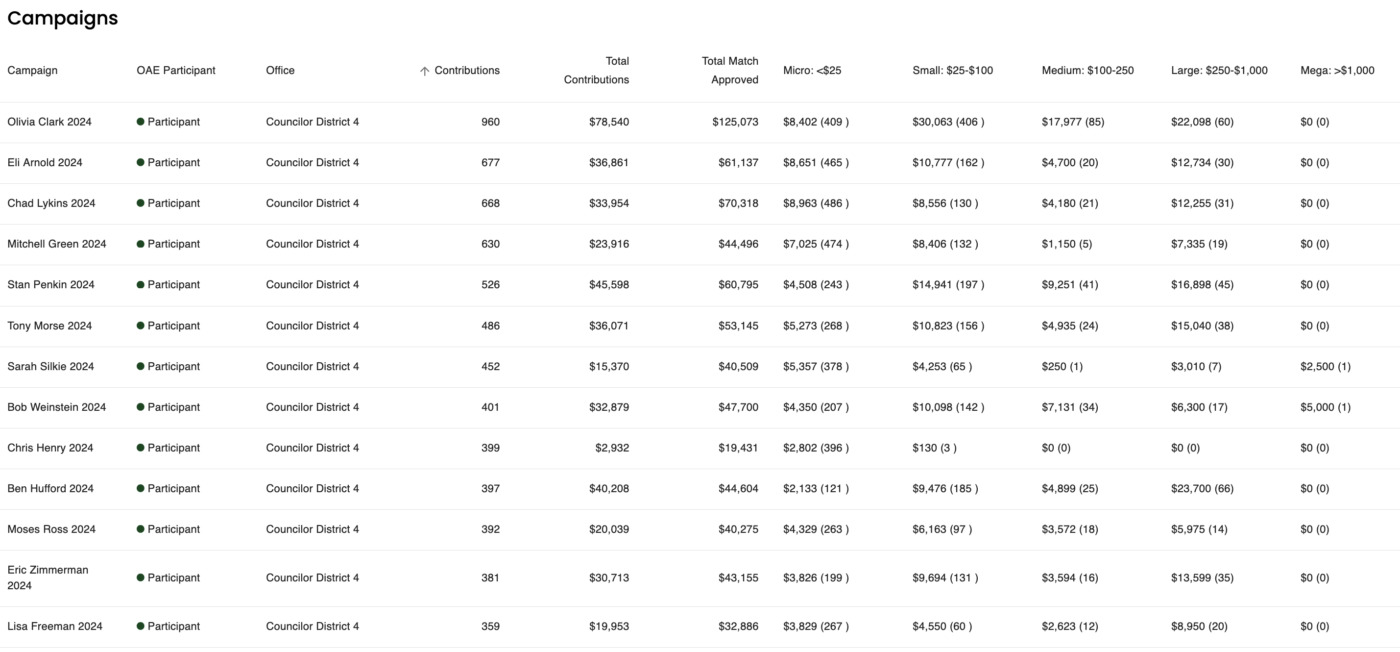
The cold, hard truth is that ballots are being mailed in six weeks. Candidates are accelerating into the final stretch. Yard signs are going up. A mailer or two are being prepared. And that all takes money. So if you are a voter who doesn’t know where to begin, is short on time, and just wants to cut to the chase, I suggest starting by looking at the fundraising. Pick your threshold, maybe it’s 250 donations, and focus your attention on the candidates above that.
But hey, if you’ve got a twinkle in your eye for someone who is behind with the funds, more power to you and I’m cheering you on. Go for it! That’s the whole point of ranked choice voting, you get to vote your conscience and still have some votes left over to play with.



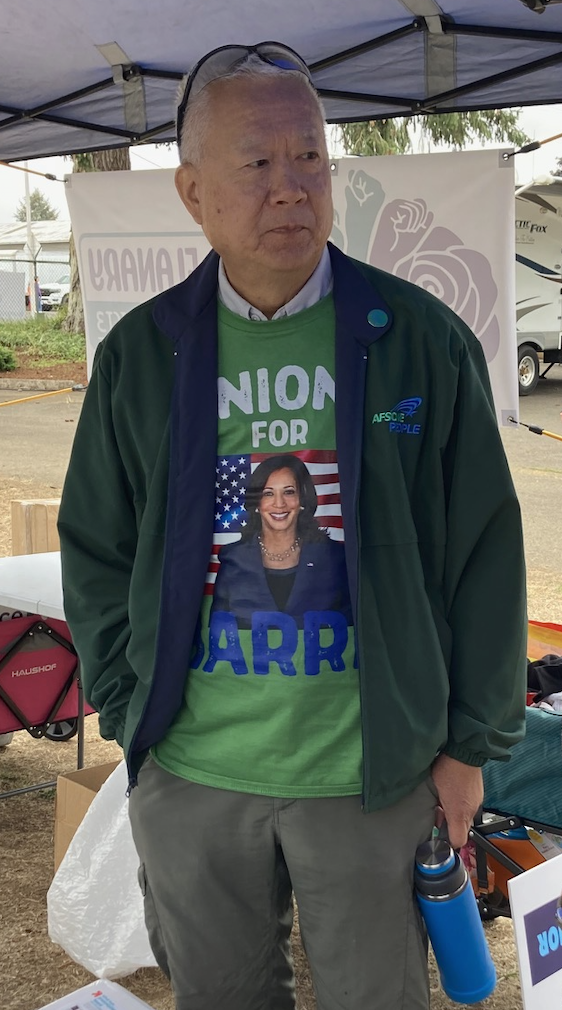
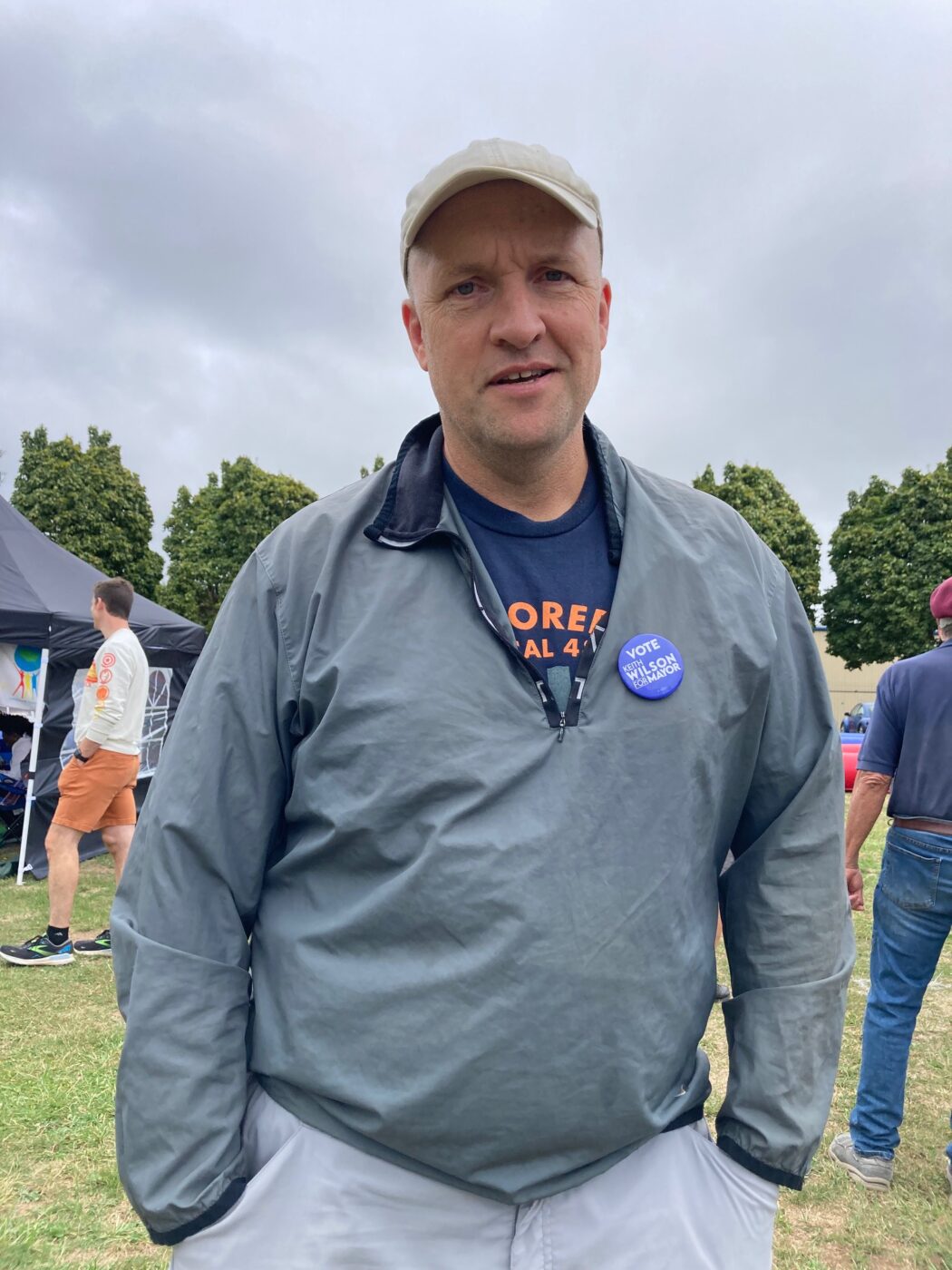

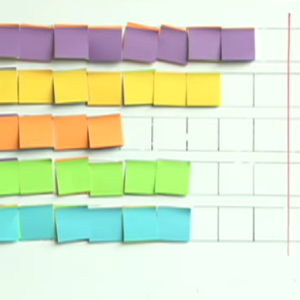

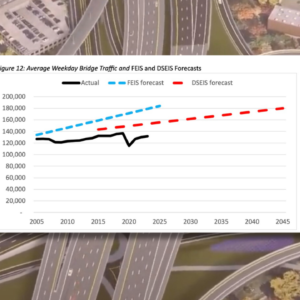
Thanks for reading.
BikePortland has served this community with independent community journalism since 2005. We rely on subscriptions from readers like you to survive. Your financial support is vital in keeping this valuable resource alive and well.
Please subscribe today to strengthen and expand our work.
thanks, Lisa. That was quite helpful for beginning to sort through the candidates in my district.
I’m glad you liked it, Jeff. I’m a little compulsive, so any table of numbers which occasionally change is like catnip to me. Which is to say, I check this thing way too frequently. Keep in mind that the good people at Small Donor Elections are lagging a bit in their data entry. I spoke with a candidate yesterday who said she had about a hundred donations which hadn’t made the table yet. (So my D4 screenshot might have left off a candidate or two who have achieved the 250 donations to qualify for city funds.)
Hi Lisa,
It seems like Willamette Week showed that the small donation program is not actually accurate in regards to voter appeal (and that’s just the aspect of it that was caught there is most likely more wide spread malfeasance). Do you think something like this is an outlier, a problem with using money to gauge popularity or maybe just one of those things that happen?
https://www.wweek.com/news/2024/09/05/council-candidates-discussed-trading-donations-to-leverage-public-matching-funds/
Good to hear from you Jake, and thank you for the link to Sophie Peel’s WW piece. Oh dear. This is the kind of thing that an experienced candidate would not get caught up in. I think it is a one-off, nothing widespread or significant.
The more interesting question to me is how well small, $5 donations via social media will correlate with actual votes. Do some ways of raising money more directly translate into votes? For example, does pressing flesh at a house party result in stronger ties to the community network than clicks on a Tik Tok page? Or do we just say money is fungible, doesn’t matter how you raise it. I really don’t know, but I will be looking at the D3 results to get a better idea.
In that district you have two candidates, Tiffany Koyama-Lane and Angelita Morillo, who have done a stand-out job in the number of donations they have raised. City-wide, including the mayoral candidates, they are the top two. But the bulk of their donations are in the “micro” category of under $25. And they are running against more established political figures, like Steve Novick and Rex Burkholder, whose donations are more evenly distributed across the dollar-amount tranches. I’m on the edge of my seat watching this.
Your enthusiasm for the process is definitely infectious. Peel’s story did sound scandalous, but hopefully it is just amateurs being amateurs. I appreciate you sticking with the nuts and bolts of how the rules work in the now rather than lamenting “what might have been” or “how it could be better” in your discussions of the process. They are the rules in play right now and I am becoming increasingly curious how the number of donations in numbers and dollars will compare to the final results come election day. Thanks for your response, it’s always pleasant hearing your informed viewpoint!
Yep – I’m certainly not voting for candidates based on AFL-CIO endorsements, or any other endorsements, really.
Unfortunately, with so many candidates to choose from, and the cognitive difficulty of ranking such a large list, it seems likely that endorsers will have more sway than ever.
You can only rank up to six, and you don’t need to rank more than one.
If many people don’t rank multiple candidates, the number of discarded votes* could be very high. I would be very amused by this outcome.
OK, I’ll take the bait. This is the kind of problem I used to like 40 years ago when I had a younger, plumper brain. Can you construct an edge case that would trip up this algorithm? I’ll start.
At least 25% of the voters act in aggregate to vote with single-ranked ballots which cover all candidates, excluding the three candidates receiving the most votes. This denies the lowest-scoring of the three the 25%+1 votes s/he needs to win. And I suppose, if all other votes are evenly placed, the other two near-winners also might not get the “+1” they need to win.
I admit to not being as sharp as I once was, but can you come up with a more probable scenario?
People who do not have the top three in their votes will have their vote discarded (e.g. never considered in the total). The chance of this happening increases when many voters only select a one or two candidates (depending on field size and distribution). This is one of the misleading aspects of claiming that candidates will win with 25%+1.
75% of the voters will have selected one of the top three candidates, everybody’s vote counts once.
Currently, with only one winner, nearly 50% of the people “will have their vote discarded.” (That wording is really misleading, btw, it’s not discarded, but it doesn’t count toward a winning candidate.) You are right, distribution of votes matters. But if I look at the the distributions of the number of donations, and the amount of donations, they fall into typical distribution curves, with an obvious top-ranked candidate in each district followed by pretty defined clouds of people vying for 2nd and 3rd place. I don’t see anything unusual or troubling.
Where the 2nd- and 3rd-ranked votes of the winning candidate fall will be important in determining the next two winners. Say a candidate wins with 52% of the vote, then a significant 27% of those overflow or “surplus” votes will count toward the 2nd-ranked choice of those 52% winning voters.
So yes, rank a bunch of candidates. We have a strong pool in D4, and I will have no trouble ranking 6, and wish I could rank 8.
A vote that does not appear in the vote total used to create the three STV tranches is, in fact, discarded.
Considering that you have repeated several times on this blog that someone can choose to vote for just one candidate, it’s nice to see you walk back this advice. Anyone who wants their vote to be counted and not discarded should vote for more than one candidate (the precise number needed to ensure that your vote is counted depends on the field size and the vote distribution).
I have never, ever suggested only ranking one candidate for city council. I’m just describing the rules of the game. So no, I’m not “walking anything back,” don’t do that to me.
But I don’t think a voter should rank candidates s/he doesn’t want to see win, just to fully complete the ballot. This becomes especially important in the mayor’s race.
My comment did not address the mayor’s race and your comment did not refer to the mayor’s race:
My initial post: “People who do not have the top three in their votes.”
How is that different than the status quo? That’s not a vote being discarded, that’s just voting for the losing candidate(s).
If your vote is not in the winners tranche (or what’s left over following discards) it is not part of the total number of votes that decide the election which is a ridiculous outcome, IMO.
You still need to sort through them all enough to find the top 6, then rank those more carefully. You could just pick one. Or you could not vote at all.
We are theoretically better off with more choice. But am I really better off having 30 brands of toothpaste to sort through to find just the right one, rather than having to pick between two or three that don’t quite speak to me?
At least with toothpaste, I don’t need to be (literally) governed by the results of analysis paralysis by my fellow citizens.
https://www.scientificamerican.com/article/the-tyranny-of-choice/
This is true in any election, and it’s not especially different now. You’re not looking at all the candidates, only the ones in your district. The pool isn’t huge.
No, as has been said again and again, you don’t have to do that. Find candidate(s) you want to win, and put them on the list. That’s all you have to do. It can be one.
Twenty-plus candidates is a huge pool compared to what we’re used to, especially in a general election (primaries have much lower rates of participation). Sifting through those to find ones you like requires considerably more effort than we’re accustomed to, and is probably more work than most people are willing to do without endorsements and incumbency to guide them.
In the ranked order you prefer them. You could partially disenfranchise yourself and order arbitrarily, or just choose only one. You could even not bother and pick zero and do something enjoyable instead.
Once of the problems seen with this voting system is that some voters simply rank the top of the list 1,2,3,4,5,6.
https://en.wikipedia.org/wiki/Donkey_vote
Is it not the case that “some people” choose the top name in previous elections, too, which affects our old voting system too?
I’m interested in the problems with the new system, but so far I haven’t heard any compelling problems unique to the it. And I’m interested in the potential benefits.
I need to correct an error I made: The Oregonian is reporting that District 3 has 30 candidates, and District 4 has 29. I considerably understated the size of the candidate pool voters will be contending with. The Oregonian also noted that those numbers may yet increase.
https://www.oregonlive.com/politics/2024/09/117-candidates-running-for-city-office-in-portland.html
This is a conclusion that the Oregonian has come to as well:
https://www.oregonlive.com/politics/2024/09/business-labor-other-alliances-likely-to-wield-unprecedented-sway-in-portland-elections.html
Whether you think endorsing orgs having more sway is a good thing or not is a matter of interpretation.
Ireland also has a form of ranked voting, for local council and (rare) mayoral races, the national parliament, and Euro parliament seats. It’s interesting to see how each party endorses candidates (there are at least 5 major political parties in Ireland) and the number of independent candidates who do in fact get elected, often unexpectedly due to the ranking process and frequent recounts (as each lowest rank candidate is forced out, their votes are redistributed during each recount – some winners only won on the 19th recount – it can take days to get a result.)
I know the Portland city council and mayor elections are officially non-partisan. Of the 78 or so Portland candidates, I wonder, how many are Republican, Democrat, third party, or non-partisan on their voter registration? Will MAGA Republican voters look up all the candidates and vote just for the few Republicans running?
David I can tell you live in NC. I’m thinking there may be only 2 or 3 MAGA voters in all of Portland. If there are more they certainly wouldn’t say it out loud. :). And despite it being “non-partisan” there appears to be zero Republicans amongst the 87 candidates running for City Council and zero for mayor as well.
You would be shocked how many MAGA voters (yes more than 2 or 3 🙂 ) are in the minority community. You’d think they’d be anti-Orange hair, but boy are they over the top believers of his BS.
Some of it comes down to they think the Repubs are anti-communist and the Demos aren’t. No amount of trying to correct them works. (at least the minority community I have interactions with)
There are socialists, progressives (meh), and democrats (vomit) running but I’m so very,very sorry that the party of xenophobia, racism, and ignorance is not well represented.
It seems like your favored “party” may be one of intolerance. I’ve noticed it’s a very common affiliation in Portland.
I admit to being intolerant when it comes to the politics of the democratic party. Is it now somehow wrong to have political opinions, Angus? Perhaps someone else is intolerant of political diversity…
lol, this abuse of the concept of “intolerance” is funny.
You better believe I’m “intolerant” of political views that are bad. So intolerant I will vote against them. I will vote for them to have no voice in government!
I’m not. I accept that the people around me may have different political views than I do and I think tolerating people who see the world differently is an essential part of living in a society.
To be intolerant of “bad” political views is to draw your bubble ever closer.
One can be intolerant of certain political views while tolerating people who see the world differently. The two are not the same, and conflating them is not logically sound.
Tolerate means to accept. Specifically: To allow the existence, occurrence, or practice of (something that one does not necessarily like or agree with) without interference, or to accept or endure (someone or something unpleasant or disliked) with forbearance. (Oxford/Google).
How do you tolerate people without also tolerating the fundamental and inseparable way they see and understand the world?
If you’re arguing semantics rather than substance, then whatever.
How do we “allow the existence” of people without allowing the expression of certain beliefs or attitudes? Simple, we just don’t allow the expression of those attitudes. No advocating for child rape or genocide, no yelling “fire” in a crowded theater, etc.
None of those things you listed are political views. So if by “won’t tolerate certain political views” you really mean “won’t tolerate antisocial behavior”, then we may not really disagree at all.
Yes, they are political views. Some people think homosexuality should be a crime, as another easy example. I’m intolerant of that political belief.
You’re playing dumb. Don’t pretend intolerance of political views is intolerance of people. This is a stupid line of reasoning. However some people like to try and hijack social justice language to try and pretend you should allow any and every intolerable view they espouse. It’s the dumb game Angus was trying to play up thread.
If the only political views you’re intolerant of are those of extremists (anti-homosexual, antisemitic, pro-violence, and the like), then my comments don’t apply. I thought you were talking about being intolerant of the types of political views that are more typical of Portland, since that was the context we were discussing.
If I misunderstood, I apologize.
One person’s extremist views is another person’s (and their followers’) reasonable opinion. An extreme example is just for illustration because I expected you would agree with me on that. But surely you must recognize there is a whole continuum between that obvious extreme view and innocuous uncontroversial nothing opinions.
You’re just taking the tack “my views are normal and define what politics is, other people’s views aren’t politics, they’re just extremist views.” It’s certainly one of the definitions of all time.
But lets try another angle. If you weren’t intolerant of an idea, why would you try to legislate anything? Why would any law be worthy of repealing or changing? Maybe this explains your whole status quo thing, maybe you really believe that. Whatever already is is what is correct because to change it would be “intolerant”.
I think you are confusing intolerance with disagreement. For example, I want increased restrictions on gun ownership and possession, and I vote for people who I hope will legislate accordingly. I tolerate people who hold the opposite view, and I see their outlook as legitimate, even if I strongly disagree.
Reread the definition of tolerance I posted above; it does not refer to not passing laws that someone whose views you tolerate may oppose.
Not at all. I think there is a general consensus of what constitutes extremist views in America. I don’t think I get to define it myself. But you are right that I see my political views are well within the realm of “normal”, on many issues sitting as far to the left as you can go before detaching from reality, and maybe a little further on climate change and other environmental issues.
Personally I don’t see much that looks like “to accept or endure (someone or something unpleasant or disliked) with forbearance” when it comes to statements you disagree with. Therefore by your own definition you are acting with intolerance.
Ok, you win. I’m intolerant because there are views I disagree with.
You said it yourself. “Tolerate means to accept.” If you reject any views that means you do not tolerate them. QED.
“intolerant of political views” == political disagreement
perhaps there was some confirmation bias in your many posts here, Watts. those leftist must have been “intolerant” to people not their views…eh?
So, asking for a friend, but does that mean YOU get to be the one to determine what’s ok or not ok to talk about?
I’m so sick of the Social Justice Warriors declaring what’s acceptable to talk about and what isn’t.
Are you kidding? I get to decide, obviously. As does everyone else. Welcome to politics.
Conservatives (“pragmatists” in PDX) like to describe their own solipsistic caricature of liberals as “snowflakes” but the minute they meet a genuine leftist/socialist they suddenly act as if the mere existence of ~7-10% of the population is a fundamental affront to their freedom of speech. IMO, all of this uproar over “social justice warriors” or “woke liberals” is just projection rooted in the cognitive dissonance of imaginary grievance.
Advocating the violent overthrow of the US government was made a crime in 1940. Those pesky SJWs at it again, declaring what’s acceptable to talk about and what isn’t!
I personally tend to disregard most endorsments. Primarily becuase they come from the status quo power brokers. In Portland 2024 that is primarily the well funded non-profits and unions such as PAT, SEIU. If you want to look for an “out of the usual Portland box” look at the pragmatic, disrupt the status quo voting guide from Future Portland. They are the one group I’ve found that doesn’t just keeping supporting the same type of politicians that got us into the current mess. This site would be for those who lean toward pragmatic candidates such as Vadim Morzysky, Sam Adams, Rene Gonzalez and Nathan Vasquez.
They haven’t posted their city counicl recs yet but apparently will soon,.
https://futureportland.org
I attended one of their forums, and there was a good cross section of candidates on hand, with no particular outlook dominating. I got to meet and chat with a few of the folks who have been profiled on this site, and a few who haven’t been.
Even if you hate pragmatism (and Clear Eyed Realism), Future Portland events are a good place to meet the candidates and learn what they’re about. Seeing them side-by-side makes it much easier to distinguish between those who have some idea what’s going on from those who just fell out of a coconut tree.
Good point. They did have Status Quo Rubio come speak at one of their events. Maybe they tilt farther left than one might think from a group endorsing Morzysky and Adams for Multnomah Commission. Granted they’re both left Democrats but they’re a lot less left than their opponents.
Yeah…a councilor who bent over backwards to approve new fossil fuel infrastructure in Portland is “left”. (I would think you were being sarcastic if I had not seen your other “grievance politics” comments.)
It’s almost as if you have no understanding of what “left” means but are using it as some sort of ignorant epithet to tar right-wing people that are not sufficiently far-right.
To be fair, it’s easy to think of Ohio as “the west” when your Overton window is only New England and your “pragmatic centrism” is New York. Never mind those “far west” spots like Iowa and Missouri. Places beyond that, geez, that’s just crazy talk.
(to get the most of out of this geographic analogy, imagine a map of the US roughly overlaid with the Political Compass: https://politicalcompass.org/uselection2024)
When you look up “Pragmatic” in the dictionary, you find several definitions:
When you look up “Status Quo Power Broker” in the dictionary- the definition is quite surprising.
Don’t forget spending millions on a failed drug war in the name of political expediency and uninformed moral panic. Pragmatism!
Decriminalization might have been the pragmatic choice if it hadn’t been so badly botched that the public recoiled from it in horror. Thank your leaders in Salem for poisoning the waters for decades to come with their incompetence, and out-of-state think tanks for pushing us faster than we could go.
The merits of the approach are no longer important. It’s going to be quite some time before any other state is going to be willing to give it a go.
You don’t get to claim ex mayors and current elected city officials as outsiders. Doing the will of the business community is in no way disrupting the status quo of PDX. Sorry.
Bike Portland comment section is starting to take on some serious Willamette Week vibes. Great article though.
What’s wrong with that? People actually saying openly what is on their minds or are they only allowed to say what makes you comfortable?
Why do people such as yourself so focused on censoring thoughts? Most the stuff I see in the WW comments section I don’t agree with, but I sure wouldn’t propose they be silenced just because I don’t.
Nothing in Rob’s comment suggested silencing anyone, let alone “censoring thoughts”, whatever that means.
Willamette Week comments section is the same handful of dudes yelling into an echo chamber. The same small group comments relentlessly on almost every article. It’s hostile to anyone new, and the quality of the dialog degrades with the quantity of comments. I’ll be sad when I browse the BP comments for entertainment, rather than education.
WWeek is a pretty progressive site that has a regressive comments section, because it’s so hostile it drove off all constructive dialog. But sure, go on about ideological bubbles and censorship.
I hear you Rob. Lisa and I have talked a lot about this concern that our comments section becomes too much of “The same small group comments relentlessly on almost every article.” We will always do what we can to make sure new people feel welcome and there’s a productive diversity of commenters here… but in today’s internet environment that is a very difficult thing to do!
Sounds just like another Diva that was elected to president because they were on TV.
No thanks.